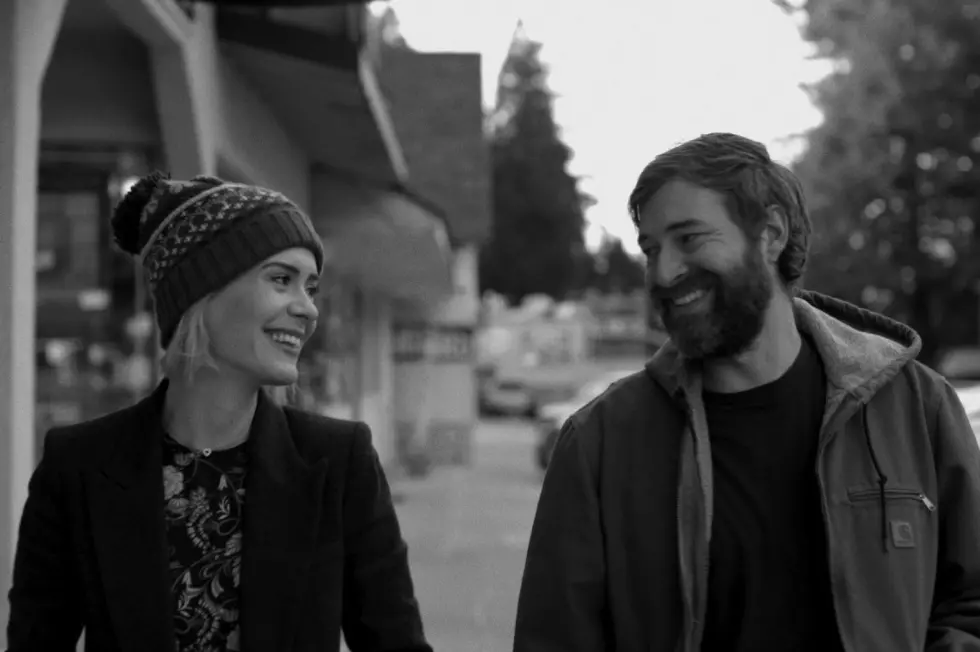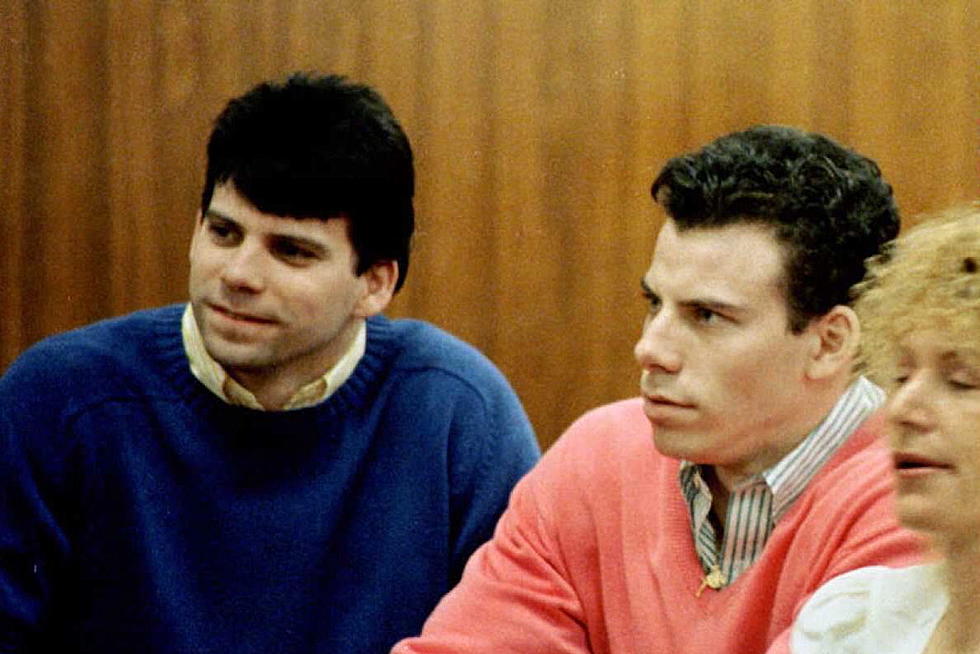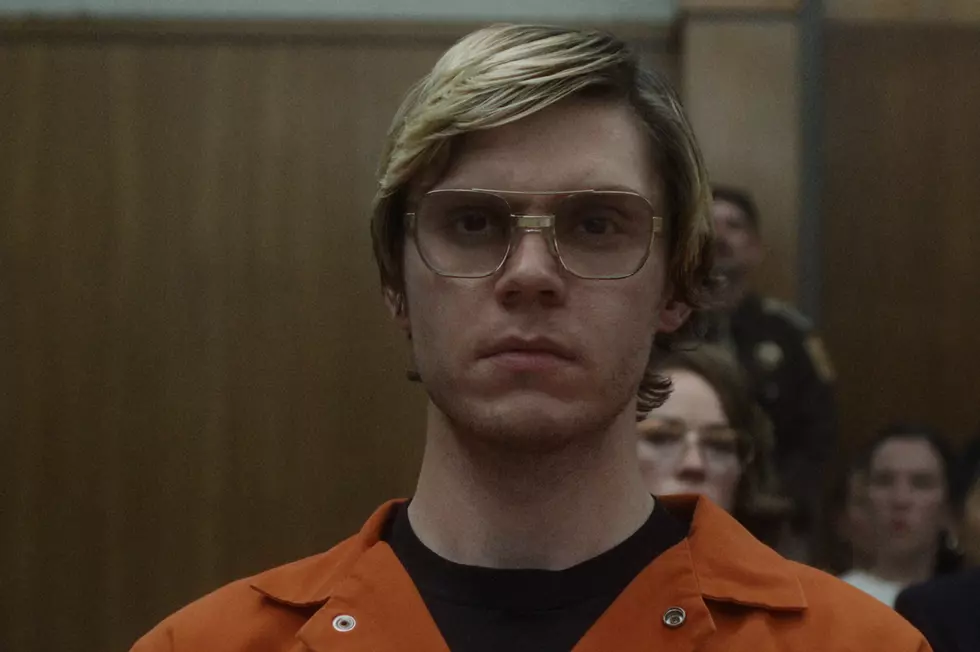
Sarah Paulson on ‘Blue Jay,’ Doing Anything Ryan Murphy Asks, and a Billie Dean Howard ‘AHS’ Theory
For the past several years we’ve seen Sarah Paulson play some of the loudest and most extreme characters on television. Whether she’s donning a perm as Marcia Clarke, wearing two heads as Bette and Dot Tattler, or thick black eyeliner as Hypodermic Sally, Paulson is often a bold, stylized onscreen presence. But in Blue Jay, Paulson, looking like her natural self, gives a quieter performance as one of her most stripped-down characters yet.
The film, written by Mark Duplass (Togetherness) and directed by Alex Lehmann, is a walk-and-talk romance drama that finds Paulson’s Amanda running into her ex Jim (Duplass) for the first time in 22 years. We learn bits and pieces about their past over the course of the movie as the two revisit their old hangouts, but this is far from a cute and charming romance. Shot in black-and-white, Blue Jay is full of awkward silences and uncomfortable exchanges that feel like moments right out of real life.
I caught up with the recent Emmy winner to talk about Blue Jay, a film she described as “group therapy session” that required her to be more vulnerable than ever before. Paulson also told me about having to keep quiet on American Horror Story secrets and responded to a fan theory for AHS: Roanoke.
This feels like such a Duplass brothers movie in the way that it’s very naturalistic and has an awkwardness between the characters.
That’s a good thing! I think that can happen a lot of times even to some people that you’re really close to if you go a long time without seeing them for whatever reason, and then you see them in the first few minutes [and] sometimes it goes a little like, “Who the hell are you? I don’t know who you are anymore.” It’s always awkward. So, Amanda and Jim really haven’t seen each other for a long time so it makes it even more so and they had such a big history when they were sort of forming themselves in very formative years. It’s a potent thing.
When they first meet in that grocery store it’s not what you expect. It’s not this warm and friendly encounter, but it’s more a weird and stilted relationship where they don’t know how to react.
Uh huh, yeah. Which I think is very real.
What was it like to create that dynamic with characters who have a past that’s not seen on screen?
Well the most exciting part about it was we shot things sequentially, which was very, very helpful for those kinds of things. The very first we were shooting was the day we shot the grocery store scene. And so all of my trepidation and my fear about the format that we were working in, which I had never done before – which is essentially we had an outline for a story and the rest of it was created on the day and Mark always had a kind of jumping off point in what we needed from a narrative standpoint to have happen in a scene. But the rest of it was kind of based on our conversations and our prep work before the film.
Mark and myself and his producers and our director Alex, we would just sit around for what felt like group therapy sessions. We just talked a lot about our lives and our histories, and our wants, and our hopes and all kinds of things. It sort of just funneled into the place where we were gonna work from. I’d never done anything like that ever, ever, ever. And it was totally terrifying to me and I felt very unsure.
For something very true about an actor, any character you inhabit in some way or another they can be, especially if something’s very far away from you, you can really hide behind wigs and glasses and certain wardrobe things that make you feel protected. When you don’t have those things because they’re just not on the page, because there is no page per se, you end up feeling very vulnerable and you’re just kind of flapping in the breeze. And so, all of that stuff was very present for Mark and myself because he knew I was nervous about it and I had no frame of reference for what it was going to be like to do.
So all that awkwardness, all that, kind of stilted, fearful, familiar but totally weird energy between us is because there we were in the middle of Crestline and we’d driven up in the night, and we were shooting this movie and we didn’t really know what it was gonna be or what we had. So I think the energy of all that, I hope, is what was captured. That was very, very smart of Mark, I think, to shoot everything sequentially.
That makes a lot of sense after watching the movie. Was there a lot of improv between you and Mark then?
Absolutely! I mean Mark would, I think at my behest because he knew I was nervous, I would say, “ Can we just have like a few things written down so that I can at least know the beginning, the middle and end of this scene in terms of what you want to have happen?” And obviously, as I said, we had a lot of time, a few days prior to shooting where we were really just like holed up in a room together and we all just talked. So we had decided each of us for our characters what our histories were and what our relationship had been. And so we had all that internally, but it wasn’t in a script anywhere, it was in a big outline that Mark written, a couple pages of an outline.
But we still had to, in the moment, come up with it. Mark obviously is very, very good at it. He would help me if I started to go off the rails. […] He would give me little things to kind of focus on in terms of what needed to happen story-wise to propel the story forward, and the rest of it was something that we developed together, on the fly as we were shooting. I mean, not the story. The story was predetermined and the story was Mark’s idea and was Mark’s vision, with Alex. But on the day we had a kind of two-page outline for each scene and that was it.
Do you think that experience has changed the way you approach roles now? Has that fear of working so on-the-fly helped you in roles you’d taken since?
I definitely think that there’s something very pure and very honest that comes when you don’t have a set text to work off of. At least the way I like to work, I try to bring my whole self to the experience. In terms of my own experiences and my own way of seeing things, but you’re obviously funneling that or filtering that through whatever your character is going through. whatever your character’s experience is. Those kinds of things are part of the job when you’re playing another character, but somehow with this I had such freedom to bring as much of myself forward as I wanted to. I haven’t really done that. I’ve never really done a movie like this, where I don’t have a wig on, I don’t have an extra head, I’m not doing some antebellum south thing.
This is a girl that’s not that far left-of-center of my own center, you know? She’s not me. But it was very interesting or it was a little scary to sort of live in that place because, like I said before, it’s nice to have the comfort of a character to sort of, not hide behind, but shield yourself from in a way. It’s a very vulnerable thing to put yourself out there in any respect ever. When you’ve got a character to play, you can say, “This isn’t me doing this, these are my characters choices. My character wants this, my character needs that.” You can sort of stake your claim and hide behind that cover. Whereas it’s hard to do that when you’re doing something like this. So I hope to do more things like it. It was really exciting and totally terrifying.
Right now you’re also in the most mysterious season of AHS yet. Do you know where the season is headed, or has Ryan Murphy kept you in the dark?
No, I know where it’s going. We all did as actors because there’s a big U-turn that happens in Episode 6. We all knew that was coming. We didn’t have the scripts to say what that was going to be, but we knew what the concept was. We knew that something was going to happen. We weren’t as in the dark as you are in the dark, and we were obviously ahead on scripts versus when the show started airing we were already shooting Episode 7.
But it’s been hard to keep most of it to ourselves. People ask questions and you want to tell them because I think the season is so fun and scary and unique. I love the complete about-face the show has done. It doesn’t have any of those typical things that you associate with American Horror Story in terms of operatic style and crazy camera – it’s really kind of exciting to have stripped the whole thing down. It’s one of the most exciting things about being on the show; how different it gets to be and people still come along for the ride and how exciting that is. Yeah, it’s been hard to keep it a secret because I’ve been wanting be like, “Oh wait! Just you wait!” I just gotta sit around and tell no one.
You’re also in the second season of American Crime Story and Feud. What’s it like to play characters on such vastly different shows all within this big Ryan Murphy multiverse?
Oh God, I feel like an actress back in the days of MGM where this is where I get to work. I get to work in the studio that is Ryan Murphy. I just never felt more at home or more seen or safer than working for him, ever. Anything he asks me to do, I will do because he always seems to have an idea for me that is scary and incredibly challenging and almost untouchable in terms of what I would really rather not try. I’m so afraid I’m not going to pull it off, whether it’s the twins or Marcia [Clark] or any of that stuff. I haven’t started Feud yet or the other season of Crime Story so I can’t speak to those yet in terms of actual material. I just know that my home is where Ryan Murphy is, when it comes to my work.
I read about a theory for this season AHS. It’s the Billie Dean Howard theory, that My Roanoke Nightmare is Billie Dean Howard’s reality series. Have you heard it?
Oh I sure have.
What are your thoughts on it?
No comment. We’ll see what people do with that, the non-comment comment. They’ll go, “That’s confirmed!” “It’s denied!” It’s just no comment folks, there’s just no comment.
Blue Jay is now playing in New York and available on VOD.
More From ScreenCrush









